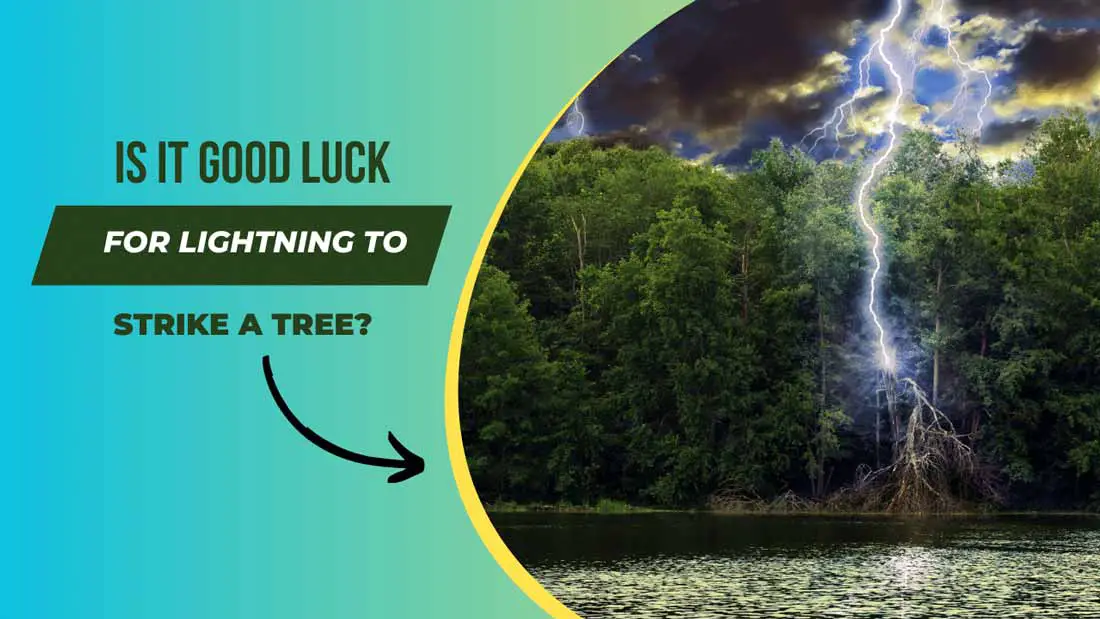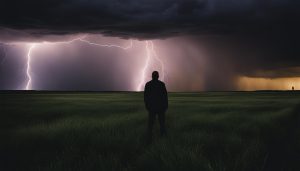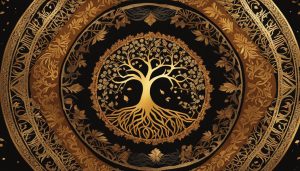Lightning, a spectacular yet terrifying display of nature’s power, manifests due to the buildup of electrical charges in the atmosphere.
Interestingly, this powerful force of nature has an affinity for trees, often setting them ablaze or splintering them into fragments. Traditionally, folklore and superstition color our perceptions of such events, leading some to perceive lightning-struck trees as carriers of good luck.
But how much truth does science offer to support or refute this belief? This article investigates the myth, history, science, and potential dangers of lightning-struck trees, offering a balanced view of this intriguing topic.
Contents
- 1 The Historical Roots of Lightning-struck Trees:
- 2 The Science Behind Lightning-struck Trees:
- 3 The Different Types of Lightning-struck Trees:
- 4 Global Beliefs About Lightning-struck Trees:
- 5 The Dangers of Lightning-struck Trees:
- 6 The Folklore and Mythology Surrounding Lightning-struck Trees:
- 7 Conclusion: Is it Good Luck for Lightning to Strike a Tree?
- 8 FAQs
- 8.1 What causes lightning to strike a tree?
- 8.2 Are certain types of trees more likely to be struck by lightning than others?
- 8.3 Can a tree survive a lightning strike?
- 8.4 Are there any benefits to using wood from a tree struck by lightning?
- 8.5 Is it safe to keep a tree that has been struck by lightning?
The Historical Roots of Lightning-struck Trees:
Tracing the belief in lightning-struck trees back to its origins, we discover that it is steeped in ancient history and mythology. Many cultures perceived these trees as sacred symbols representing divine intervention.
For instance, in Norse mythology, Thor, the god of thunder and lightning, was closely associated with such trees, leading followers to consider them symbolic representations of this deity.
During the Middle Ages, these trees were sought for their purported medicinal properties. The wood from lightning-struck trees was believed to have magical capabilities, providing cures for various ailments.
However, these beliefs were based on superstition and anecdotal evidence, needing more empirical backing.
Also read: Is it Good Luck if it Rains at a Funeral?
The Science Behind Lightning-struck Trees:
The association of good luck with lightning-struck trees is a product of cultural mythology, with no concrete scientific evidence supporting this belief.

However, some research suggests that lightning-struck trees may possess specific beneficial properties, though not of a mystical nature.
Investigations have shown that wood from lightning strikes contains higher antioxidants than wood from non-struck trees.
Antioxidants are compounds that neutralize harmful free radicals in the body, offering potential health benefits. Nevertheless, further research is needed to verify these findings and explore their implications.
The Different Types of Lightning-struck Trees:
Lightning does not discriminate among tree species; however, some types are more prone to lightning strikes due to their physical characteristics.
Trees that are taller, isolated, or situated near water bodies are more likely to be struck. Due to their height and moisture content, species such as oak, pine, and poplar are frequent victims of lightning strikes.
Global Beliefs About Lightning-struck Trees:
Beliefs about lightning-struck trees vary significantly across different cultures and geographies. In some African cultures, a lightning-struck tree is perceived as a bad omen or curse, while in certain Native American tribes, it’s seen as a powerful spiritual symbol.
Meanwhile, several Asian cultures consider it a source of good fortune. However, these beliefs mainly derive from ancient folklore and cultural norms rather than scientific rationale.
The Dangers of Lightning-struck Trees:
Contrary to their supposed lucky connotation, lightning-struck trees can pose significant risks. The intense heat from a lightning strike can seriously damage or kill the tree, often making it susceptible to pests and diseases.
Furthermore, such trees can pose a safety hazard. A weakened or dead tree can easily fall, causing injury or property damage.
Therefore, professionals should inspect lightning-struck trees to determine their structural integrity.
The Folklore and Mythology Surrounding Lightning-struck Trees:
The folklore and mythology surrounding lightning-struck trees are as varied as the cultures they originate from.
From the symbolic seat of Norse gods to sources of magical healing in the Middle Ages, these trees have been a significant part of many stories and beliefs.
While they continue to captivate the human imagination, it’s important to distinguish between myth and fact.
Conclusion: Is it Good Luck for Lightning to Strike a Tree?
Lightning-struck trees, while fascinating, carry a rich tapestry of myth, folklore, and superstition but lack definitive scientific evidence associating them with good luck.
Some studies suggest the potential benefits of lightning-struck wood, but these require further research. Moreover, the potential risks these trees pose should be considered.
Ultimately, the perception of a lightning-struck tree as a lucky omen essentially boils down to individual beliefs, often influenced by cultural, historical, and personal factors.
In the eyes of science, a tree struck by lightning is primarily an intriguing natural phenomenon that combines the raw power of the atmosphere with the resilient strength of the forest.
Also read other articles regarding good luck
FAQs
What causes lightning to strike a tree?
Lightning is caused by the buildup and discharge of electrical energy between positively and negatively charged areas. Trees often get struck due to their height, making them the shortest path to the ground, especially in an open space. Lightning is also attracted to moisture, and trees, being living organisms, contain water and hence, are more likely to be hit.
Are certain types of trees more likely to be struck by lightning than others?
Some tree species are more prone to lightning strikes due to their physical characteristics. Trees that are tall, isolated, or located near water bodies are at a higher risk. For example, oaks, pines, and poplars are often struck due to their height and high moisture content.
Can a tree survive a lightning strike?
A tree’s survival after a lightning strike can depend on several factors, including the strike’s intensity, the type of tree, and its overall health before the strike. A powerful strike can instantly kill a tree. However, many trees can survive lightning strikes, although they may sustain significant damage and become more susceptible to diseases and pests.
Are there any benefits to using wood from a tree struck by lightning?
While there’s a belief that wood from lightning-struck trees has beneficial properties, the scientific evidence to support this is limited. Some studies suggest that such wood contains higher antioxidants, which benefit human health. However, more research is needed in this area.
Is it safe to keep a tree that has been struck by lightning?
A tree struck by lightning can pose potential hazards. The strike can weaken the tree’s structure, making it more likely to fall, which can cause injury or property damage. Such a tree can also be more susceptible to diseases and pests. It’s advised to have the tree inspected by a professional after a lightning strike to assess its health and stability.





